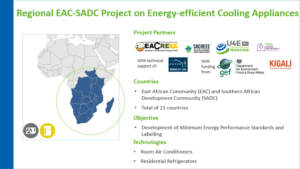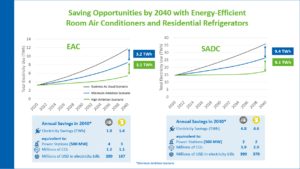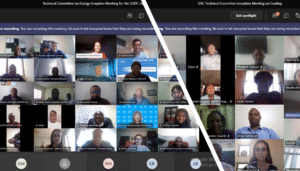In the East African Community (EAC) and Southern African Development Community (SADC) regions, growing populations, urbanization and rising living standards are expected to cause a tremendous increase in energy demand by 2030 and beyond. Air conditioners and refrigerators account for a large proportion of the electricity demand in EAC and SADC and many of old air conditioners and refrigerators currently installed use unnecessarily large amounts of electricity.

The cornerstone of the approach is to support the development and harmonization of minimum energy performance standards (MEPS) for room air conditioners and residential refrigerators (cooling products) in both regions. Harmonized MEPS across the regions will leverage the effect of the policies by reducing barriers to trade and enabling businesses to reduce costs. In addition, best practices and lessons learned on national implementation can be shared among the countries. As a further advantage, harmonizing energy efficiency standards for cooling products with those of large markets could mitigate the dumping of inefficient and environmentally harmful products.

In addition, Technical Committees have been established in the EAC and SADC regions, which will play a pivotal role in supporting the development of these harmonized MEPS and facilitate their adoption at a national level. The policies developed with the guidance of the Technical Committees will contribute greatly to setting the regions onto a net-zero emission pathway and also result in significant benefits for the population through a more stable grid and reduced electricity bills.

To download the market assessment report for the regions and the associated technical notes for refrigerators and air conditioners, visit the Regional EAC-SADC Project on Energy Efficient Cooling Appliances page on the U4E website. For further information on the project contact, Madeleine Edl at madeleine.edl@un.org.